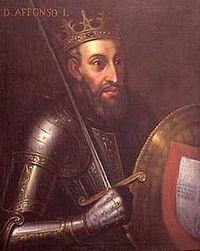Afonso I King of Portugal 1 2
- Born: 25 Jul 1109, Viseu, Viseu, Portugal
- Marriage (1): Maud of Savoy before Jun 1146 in Chambéry, Savoie, France
- Died: 6 Dec 1185, Coimbra, Coimbra, Portugal at age 76
- Buried: Santa Cruz Monastery, Coimbra, Coimbra, Portugal
Other names for Afonso were Affonso I "the Conqueror" King of Portugal and the Algarves, Afonso Henriques King of Portugal, Alfonso I King of Portugal and Henriquez I King of Portugal.
Research Notes:
First king of Portugal.
From Wikipedia - Afonso I of Portugal :
Afonso I (English Alphonzo or Alphonse), more commonly known as Afonso Henriques (pronounced [?'fősu ?'?ik??] ), or also Affonso (Archaic Portuguese), Alfonso or Alphonso (Portuguese-Galician ) or Alphonsus (Latin version), (Viseu , 1109 , traditionally July 25 - Coimbra , 1185 December 6 ), also known as the Conqueror (Port. o Conquistador), was the first King of Portugal , declaring his independence from León .
Life
Afonso I was the son of Henry of Burgundy, Count of Portugal and Teresa of León , the illegitimate daughter of King Alfonso VI of Castile and León . He was proclaimed King on July 26 , 1139 , immediately after the Battle of Ourique , and died on December 6 , 1185 in Coimbra .
At the end of the 11th century , the Iberian Peninsula political agenda was mostly concerned with the Reconquista , the driving out of the Muslim successor-states to the Caliphate of Cordoba after its collapse. With European military aristocracies focused on the Crusades , Alfonso VI called for the help of the French nobility to deal with the Moors . In exchange, he was to give the hands of his daughters in wedlock to the leaders of the expedition and bestow royal privileges to the others. Thus, the royal heiress Urraca of Castile wedded Raymond of Burgundy , younger son of the Count of Burgundy , and her half-sister, princess Teresa of León , wedded his cousin, another French crusader, Henry of Burgundy , younger brother of the Duke of Burgundy . Henry was made Count of Portugal, a burdensome county south of Galicia , where Moorish incursions and attacks were to be expected. With his wife Teresa as co-ruler of Portugal, Henry withstood the ordeal and held the lands for his father-in-law.
From this wedlock several sons were born, but only one, Afonso Henriques (meaning "Afonso son of Henry") thrived. The boy, probably born around 1109, followed his father as Count of Portugal in 1112 , under the tutelage of his mother. The relations between Teresa and her son Afonso proved difficult. Only eleven years old, Afonso already had his own political ideas, greatly different from his mother's. In 1120 , the young prince took the side of the archbishop of Braga , a political foe of Teresa, and both were exiled by her orders. Afonso spent the next years away from his own county , under the watch of the bishop. In 1122 Afonso became fourteen, the adult age in the 12th century . He made himself a knight on his own account in the Cathedral of Zamora , raised an army , and proceeded to take control of his lands. Near Guimarăes , at the Battle of Săo Mamede (1128 ) he overcame the troops under his mother's lover and ally Count Fernando Peres de Trava of Galicia , making her his prisoner and exiling her forever to a monastery in León . Thus the possibility of incorporating Portugal into a Kingdom of Galicia was eliminated and Afonso become sole ruler (Duke of Portugal) after demands for independence from the county's people, church and nobles. He also vanquished Alfonso VII of Castile and León , another of his mother's allies, and thus freed the county from political dependence on the crown of León and Castile . On April 6 , 1129 , Afonso Henriques dictated the writ in which he proclaimed himself Prince of Portugal.
...In 1169 , Afonso was disabled in an engagement near Badajoz by a fall from his horse , and made prisoner by the soldiers of the king of León. Portugal was obliged to surrender as his ransom almost all the conquests Afonso had made in Galicia in the previous years.
In 1179 the privileges and favours given to the Roman Catholic Church were compensated. In the papal bull Manifestis Probatum , Pope Alexander III acknowledged Afonso as King and Portugal as an independent land with the right to conquer lands from the Moors. With this papal blessing, Portugal was at last secured as a country and safe from any Castilian attempts at annexation.
In 1184 , in spite of his great age, he still had sufficient energy to relieve his son Sancho, who was besieged in Santarém by the Moors. He died shortly after, on December 6 , 1185 .
The Portuguese revere him as a hero, both on account of his personal character and as the founder of their nation . There are stories that it would take 10 men to carry his sword, and that Afonso would want to engage other monarchs in personal combat, but no one would dare accept his challenge.
Afonso married Maud of Savoy, daughter of Amadeus III Count of Savoy, Maurienne and Turin and Mathilde Comtesse d'Albon, before Jun 1146 in Chambéry, Savoie, France. (Maud of Savoy was born in 1125 in <Chambéry, Savoie>, France, died on 4 Nov 1158 in Coimbra, Coimbra, Portugal and was buried in Igreja Santa Cruz, Coimbra, Coimbra, Portugal.)
|
